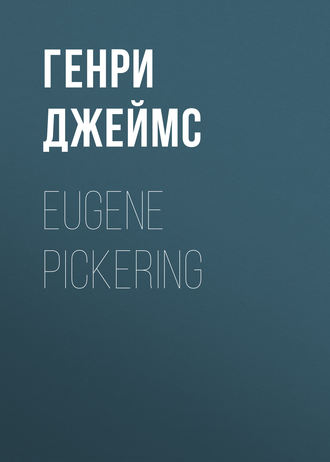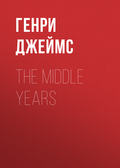
Генри Джеймс
Eugene Pickering
“Gracious powers!” I said to myself; “what an enchanting thing is innocence!”
“That portrait was taken a year and a half ago,” said Pickering, as if with an effort to be perfectly just. “By this time, I suppose, she looks a little wiser.”
“Not much, I hope,” I said, as I gave it back. “She is very sweet!”
“Yes, poor girl, she is very sweet—no doubt!” And he put the thing away without looking at it.
We were silent for some moments. At last, abruptly—“My dear fellow,” I said, “I should take some satisfaction in seeing you immediately leave Homburg.”
“Immediately?”
“To-day—as soon as you can get ready.”
He looked at me, surprised, and little by little he blushed. “There is something I have not told you,” he said; “something that your saying that Madame Blumenthal has no reputation to lose has made me half afraid to tell you.”
“I think I can guess it. Madame Blumenthal has asked you to come and play her game for her again.”
“Not at all!” cried Pickering, with a smile of triumph. “She says that she means to play no more for the present. She has asked me to come and take tea with her this evening.”
“Ah, then,” I said, very gravely, “of course you can’t leave Homburg.”
He answered nothing, but looked askance at me, as if he were expecting me to laugh. “Urge it strongly,” he said in a moment. “Say it’s my duty—that I must.”
I didn’t quite understand him, but, feathering the shaft with a harmless expletive, I told him that unless he followed my advice I would never speak to him again.
He got up, stood before me, and struck the ground with his stick. “Good!” he cried; “I wanted an occasion to break a rule—to leap a barrier. Here it is. I stay!”
I made him a mock bow for his energy. “That’s very fine,” I said; “but now, to put you in a proper mood for Madame Blumenthal’s tea, we will go and listen to the band play Schubert under the lindens.” And we walked back through the woods.
I went to see Pickering the next day, at his inn, and on knocking, as directed, at his door, was surprised to hear the sound of a loud voice within. My knock remained unnoticed, so I presently introduced myself. I found no company, but I discovered my friend walking up and down the room and apparently declaiming to himself from a little volume bound in white vellum. He greeted me heartily, threw his book on the table, and said that he was taking a German lesson.
“And who is your teacher?” I asked, glancing at the book.
He rather avoided meeting my eye, as he answered, after an instant’s delay, “Madame Blumenthal.”
“Indeed! Has she written a grammar?”
“It’s not a grammar; it’s a tragedy.” And he handed me the book.
I opened it, and beheld, in delicate type, with a very large margin, an Historisches Trauerspiel in five acts, entitled “Cleopatra.” There were a great many marginal corrections and annotations, apparently from the author’s hand; the speeches were very long, and there was an inordinate number of soliloquies by the heroine. One of them, I remember, towards the end of the play, began in this fashion—
“What, after all, is life but sensation, and sensation but deception?—reality that pales before the light of one’s dreams as Octavia’s dull beauty fades beside mine? But let me believe in some intenser bliss, and seek it in the arms of death!”
“It seems decidedly passionate,” I said. “Has the tragedy ever been acted?”
“Never in public; but Madame Blumenthal tells me that she had it played at her own house in Berlin, and that she herself undertook the part of the heroine.”
Pickering’s unworldly life had not been of a sort to sharpen his perception of the ridiculous, but it seemed to me an unmistakable sign of his being under the charm, that this information was very soberly offered. He was preoccupied, he was irresponsive to my experimental observations on vulgar topics—the hot weather, the inn, the advent of Adelina Patti. At last, uttering his thoughts, he announced that Madame Blumenthal had proved to be an extraordinarily interesting woman. He seemed to have quite forgotten our long talk in the Hartwaldt, and betrayed no sense of this being a confession that he had taken his plunge and was floating with the current. He only remembered that I had spoken slightingly of the lady, and he now hinted that it behoved me to amend my opinion. I had received the day before so strong an impression of a sort of spiritual fastidiousness in my friend’s nature, that on hearing now the striking of a new hour, as it were, in his consciousness, and observing how the echoes of the past were immediately quenched in its music, I said to myself that it had certainly taken a delicate hand to wind up that fine machine. No doubt Madame Blumenthal was a clever woman. It is a good German custom at Homburg to spend the hour preceding dinner in listening to the orchestra in the Kurgarten; Mozart and Beethoven, for organisms in which the interfusion of soul and sense is peculiarly mysterious, are a vigorous stimulus to the appetite. Pickering and I conformed, as we had done the day before, to the fashion, and when we were seated under the trees, he began to expatiate on his friend’s merits.
“I don’t know whether she is eccentric or not,” he said; “to me every one seems eccentric, and it’s not for me, yet a while, to measure people by my narrow precedents. I never saw a gaming table in my life before, and supposed that a gambler was of necessity some dusky villain with an evil eye. In Germany, says Madame Blumenthal, people play at roulette as they play at billiards, and her own venerable mother originally taught her the rules of the game. It is a recognised source of subsistence for decent people with small means. But I confess Madame Blumenthal might do worse things than play at roulette, and yet make them harmonious and beautiful. I have never been in the habit of thinking positive beauty the most excellent thing in a woman. I have always said to myself that if my heart were ever to be captured it would be by a sort of general grace—a sweetness of motion and tone—on which one could count for soothing impressions, as one counts on a musical instrument that is perfectly in tune. Madame Blumenthal has it—this grace that soothes and satisfies; and it seems the more perfect that it keeps order and harmony in a character really passionately ardent and active. With her eager nature and her innumerable accomplishments nothing would be easier than that she should seem restless and aggressive. You will know her, and I leave you to judge whether she does seem so! She has every gift, and culture has done everything for each. What goes on in her mind I of course can’t say; what reaches the observer—the admirer—is simply a sort of fragrant emanation of intelligence and sympathy.”
“Madame Blumenthal,” I said, smiling, “might be the loveliest woman in the world, and you the object of her choicest favours, and yet what I should most envy you would be, not your peerless friend, but your beautiful imagination.”
“That’s a polite way of calling me a fool,” said Pickering. “You are a sceptic, a cynic, a satirist! I hope I shall be a long time coming to that.”
“You will make the journey fast if you travel by express trains. But pray tell me, have you ventured to intimate to Madame Blumenthal your high opinion of her?”
“I don’t know what I may have said. She listens even better than she talks, and I think it possible I may have made her listen to a great deal of nonsense. For after the first few words I exchanged with her I was conscious of an extraordinary evaporation of all my old diffidence. I have, in truth, I suppose,” he added in a moment, “owing to my peculiar circumstances, a great accumulated fund of unuttered things of all sorts to get rid of. Last evening, sitting there before that charming woman, they came swarming to my lips. Very likely I poured them all out. I have a sense of having enshrouded myself in a sort of mist of talk, and of seeing her lovely eyes shining through it opposite to me, like fog-lamps at sea.” And here, if I remember rightly, Pickering broke off into an ardent parenthesis, and declared that Madame Blumenthal’s eyes had something in them that he had never seen in any others. “It was a jumble of crudities and inanities,” he went on; “they must have seemed to her great rubbish; but I felt the wiser and the stronger, somehow, for having fired off all my guns—they could hurt nobody now if they hit—and I imagine I might have gone far without finding another woman in whom such an exhibition would have provoked so little of mere cold amusement.”
“Madame Blumenthal, on the contrary,” I surmised, “entered into your situation with warmth.”
“Exactly so—the greatest! She has felt and suffered, and now she understands!”
“She told you, I imagine, that she understood you as if she had made you, and she offered to be your guide, philosopher, and friend.”
“She spoke to me,” Pickering answered, after a pause, “as I had never been spoken to before, and she offered me, formally, all the offices of a woman’s friendship.”
“Which you as formally accepted?”
“To you the scene sounds absurd, I suppose, but allow me to say I don’t care!” Pickering spoke with an air of genial defiance which was the most inoffensive thing in the world. “I was very much moved; I was, in fact, very much excited. I tried to say something, but I couldn’t; I had had plenty to say before, but now I stammered and bungled, and at last I bolted out of the room.”
“Meanwhile she had dropped her tragedy into your pocket!”
“Not at all. I had seen it on the table before she came in. Afterwards she kindly offered to read German aloud with me, for the accent, two or three times a week. ‘What shall we begin with?’ she asked. ‘With this!’ I said, and held up the book. And she let me take it to look it over.”
I was neither a cynic nor a satirist, but even if I had been, I might have been disarmed by Pickering’s assurance, before we parted, that Madame Blumenthal wished to know me and expected him to introduce me. Among the foolish things which, according to his own account, he had uttered, were some generous words in my praise, to which she had civilly replied. I confess I was curious to see her, but I begged that the introduction should not be immediate, for I wished to let Pickering work out his destiny alone. For some days I saw little of him, though we met at the Kursaal and strolled occasionally in the park. I watched, in spite of my desire to let him alone, for the signs and portents of the world’s action upon him—of that portion of the world, in especial, of which Madame Blumenthal had constituted herself the agent. He seemed very happy, and gave me in a dozen ways an impression of increased self-confidence and maturity. His mind was admirably active, and always, after a quarter of an hour’s talk with him, I asked myself what experience could really do, that innocence had not done, to make it bright and fine. I was struck with his deep enjoyment of the whole spectacle of foreign life—its novelty, its picturesqueness, its light and shade—and with the infinite freedom with which he felt he could go and come and rove and linger and observe it all. It was an expansion, an awakening, a coming to moral manhood. Each time I met him he spoke a little less of Madame Blumenthal; but he let me know generally that he saw her often, and continued to admire her. I was forced to admit to myself, in spite of preconceptions, that if she were really the ruling star of this happy season, she must be a very superior woman. Pickering had the air of an ingenuous young philosopher sitting at the feet of an austere muse, and not of a sentimental spendthrift dangling about some supreme incarnation of levity.
CHAPTER II
Madame Blumenthal seemed, for the time, to have abjured the Kursaal, and I never caught a glimpse of her. Her young friend, apparently, was an interesting study, and the studious mind prefers seclusion.
She reappeared, however, at last, one evening at the opera, where from my chair I perceived her in a box, looking extremely pretty. Adelina Patti was singing, and after the rising of the curtain I was occupied with the stage; but on looking round when it fell for the entr’acte, I saw that the authoress of “Cleopatra” had been joined by her young admirer. He was sitting a little behind her, leaning forward, looking over her shoulder and listening, while she, slowly moving her fan to and fro and letting her eye wander over the house, was apparently talking of this person and that. No doubt she was saying sharp things; but Pickering was not laughing; his eyes were following her covert indications; his mouth was half open, as it always was when he was interested; he looked intensely serious. I was glad that, having her back to him, she was unable to see how he looked. It seemed the proper moment to present myself and make her my bow; but just as I was about to leave my place a gentleman, whom in a moment I perceived to be an old acquaintance, came to occupy the next chair. Recognition and mutual greetings followed, and I was forced to postpone my visit to Madame Blumenthal. I was not sorry, for it very soon occurred to me that Niedermeyer would be just the man to give me a fair prose version of Pickering’s lyric tributes to his friend. He was an Austrian by birth, and had formerly lived about Europe a great deal in a series of small diplomatic posts. England especially he had often visited, and he spoke the language almost without accent. I had once spent three rainy days with him in the house of an English friend in the country. He was a sharp observer, and a good deal of a gossip; he knew a little something about every one, and about some people everything. His knowledge on social matters generally had the quality of all German science; it was copious, minute, exhaustive.
“Do tell me,” I said, as we stood looking round the house, “who and what is the lady in white, with the young man sitting behind her.”
“Who?” he answered, dropping his glass. “Madame Blumenthal! What! It would take long to say. Be introduced; it’s easily done; you will find her charming. Then, after a week, you will tell me what she is.”
“Perhaps I should not. My friend there has known her a week, and I don’t think he is yet able to give a coherent account of her.”
He raised his glass again, and after looking a while, “I am afraid your friend is a little—what do you call it?—a little ‘soft.’ Poor fellow! he’s not the first. I have never known this lady that she has not had some eligible youth hovering about in some such attitude as that, undergoing the softening process. She looks wonderfully well, from here. It’s extraordinary how those women last!”
“You don’t mean, I take it, when you talk about ‘those women,’ that Madame Blumenthal is not embalmed, for duration, in a certain infusion of respectability?”
“Yes and no. The atmosphere that surrounds her is entirely of her own making. There is no reason in her antecedents that people should drop their voice when they speak of her. But some women are never at their ease till they have given some damnable twist or other to their position before the world. The attitude of upright virtue is unbecoming, like sitting too straight in a fauteuil. Don’t ask me for opinions, however; content yourself with a few facts and with an anecdote. Madame Blumenthal is Prussian, and very well born. I remember her mother, an old Westphalian Gräfin, with principles marshalled out like Frederick the Great’s grenadiers. She was poor, however, and her principles were an insufficient dowry for Anastasia, who was married very young to a vicious Jew, twice her own age. He was supposed to have money, but I am afraid he had less than was nominated in the bond, or else that his pretty young wife spent it very fast. She has been a widow these six or eight years, and has lived, I imagine, in rather a hand-to-mouth fashion. I suppose she is some six or eight and thirty years of age. In winter one hears of her in Berlin, giving little suppers to the artistic rabble there; in summer one often sees her across the green table at Ems and Wiesbaden. She’s very clever, and her cleverness has spoiled her. A year after her marriage she published a novel, with her views on matrimony, in the George Sand manner—beating the drum to Madame Sand’s trumpet. No doubt she was very unhappy; Blumenthal was an old beast. Since then she has published a lot of literature—novels and poems and pamphlets on every conceivable theme, from the conversion of Lola Montez to the Hegelian philosophy. Her talk is much better than her writing. Her conjugophobia—I can’t call it by any other name—made people think lightly of her at a time when her rebellion against marriage was probably only theoretic. She had a taste for spinning fine phrases, she drove her shuttle, and when she came to the end of her yarn she found that society had turned its back. She tossed her head, declared that at last she could breathe the sacred air of freedom, and formally announced that she had embraced an ‘intellectual’ life. This meant unlimited camaraderie with scribblers and daubers, Hegelian philosophers and Hungarian pianists. But she has been admired also by a great many really clever men; there was a time, in fact, when she turned a head as well set on its shoulders as this one!” And Niedermeyer tapped his forehead. “She has a great charm, and, literally, I know no harm of her. Yet for all that, I am not going to speak to her; I am not going near her box. I am going to leave her to say, if she does me the honour to observe the omission, that I too have gone over to the Philistines. It’s not that; it is that there is something sinister about the woman. I am too old for it to frighten me, but I am good-natured enough for it to pain me. Her quarrel with society has brought her no happiness, and her outward charm is only the mask of a dangerous discontent. Her imagination is lodged where her heart should be! So long as you amuse it, well and good; she’s radiant. But the moment you let it flag, she is capable of dropping you without a pang. If you land on your feet you are so much the wiser, simply; but there have been two or three, I believe, who have almost broken their necks in the fall.”
“You are reversing your promise,” I said, “and giving me an opinion, but not an anecdote.”
“This is my anecdote. A year ago a friend of mine made her acquaintance in Berlin, and though he was no longer a young man, and had never been what is called a susceptible one, he took a great fancy to Madame Blumenthal. He’s a major in the Prussian artillery—grizzled, grave, a trifle severe, a man every way firm in the faith of his fathers. It’s a proof of Anastasia’s charm that such a man should have got into the habit of going to see her every day of his life. But the major was in love, or next door to it! Every day that he called he found her scribbling away at a little ormolu table on a lot of half-sheets of note-paper. She used to bid him sit down and hold his tongue for a quarter of an hour, till she had finished her chapter; she was writing a novel, and it was promised to a publisher. Clorinda, she confided to him, was the name of the injured heroine. The major, I imagine, had never read a work of fiction in his life, but he knew by hearsay that Madame Blumenthal’s literature, when put forth in pink covers, was subversive of several respectable institutions. Besides, he didn’t believe in women knowing how to write at all, and it irritated him to see this inky goddess correcting proof-sheets under his nose—irritated him the more that, as I say, he was in love with her and that he ventured to believe she had a kindness for his years and his honours. And yet she was not such a woman as he could easily ask to marry him. The result of all this was that he fell into the way of railing at her intellectual pursuits and saying he should like to run his sword through her pile of papers. A woman was clever enough when she could guess her husband’s wishes, and learned enough when she could read him the newspapers. At last, one day, Madame Blumenthal flung down her pen and announced in triumph that she had finished her novel. Clorinda had expired in the arms of—some one else than her husband. The major, by way of congratulating her, declared that her novel was immoral rubbish, and that her love of vicious paradoxes was only a peculiarly depraved form of coquetry. He added, however, that he loved her in spite of her follies, and that if she would formally abjure them he would as formally offer her his hand. They say that women like to be snubbed by military men. I don’t know, I’m sure; I don’t know how much pleasure, on this occasion, was mingled with Anastasia’s wrath. But her wrath was very quiet, and the major assured me it made her look uncommonly pretty. ‘I have told you before,’ she says, ‘that I write from an inner need. I write to unburden my heart, to satisfy my conscience. You call my poor efforts coquetry, vanity, the desire to produce a sensation. I can prove to you that it is the quiet labour itself I care for, and not the world’s more or less flattering attention to it!’ And seizing the history of Clorinda she thrust it into the fire. The major stands staring, and the first thing he knows she is sweeping him a great curtsey and bidding him farewell for ever. Left alone and recovering his wits, he fishes out Clorinda from the embers, and then proceeds to thump vigorously at the lady’s door. But it never opened, and from that day to the day three months ago when he told me the tale, he had not beheld her again.”






